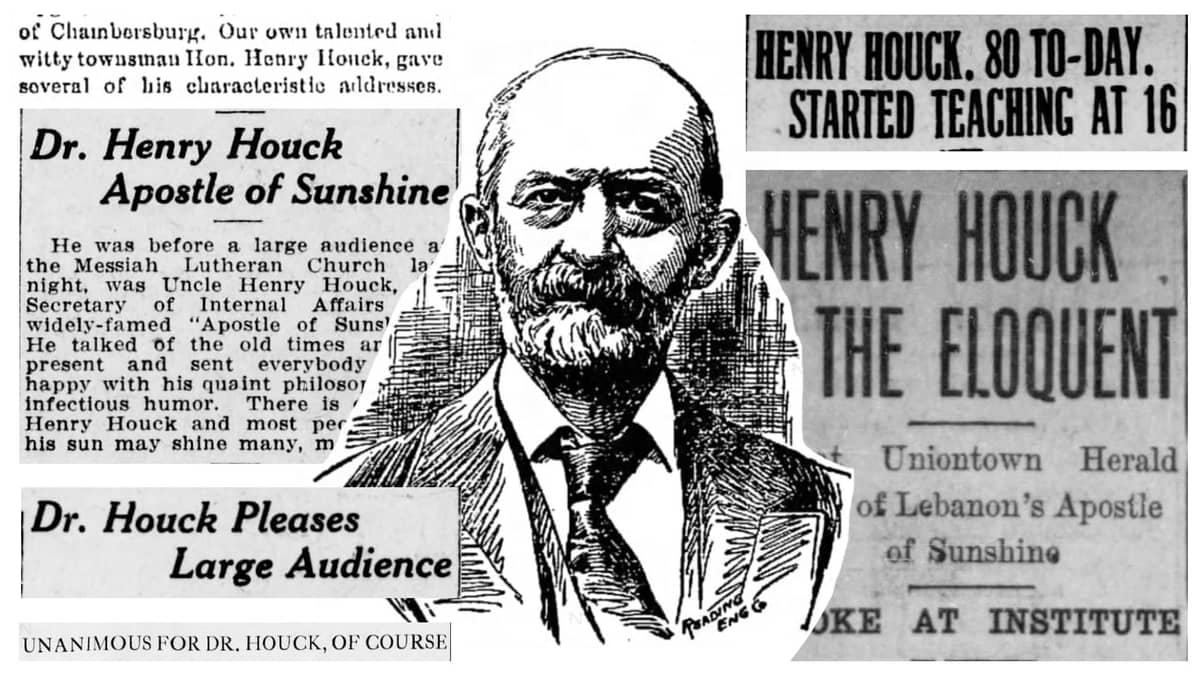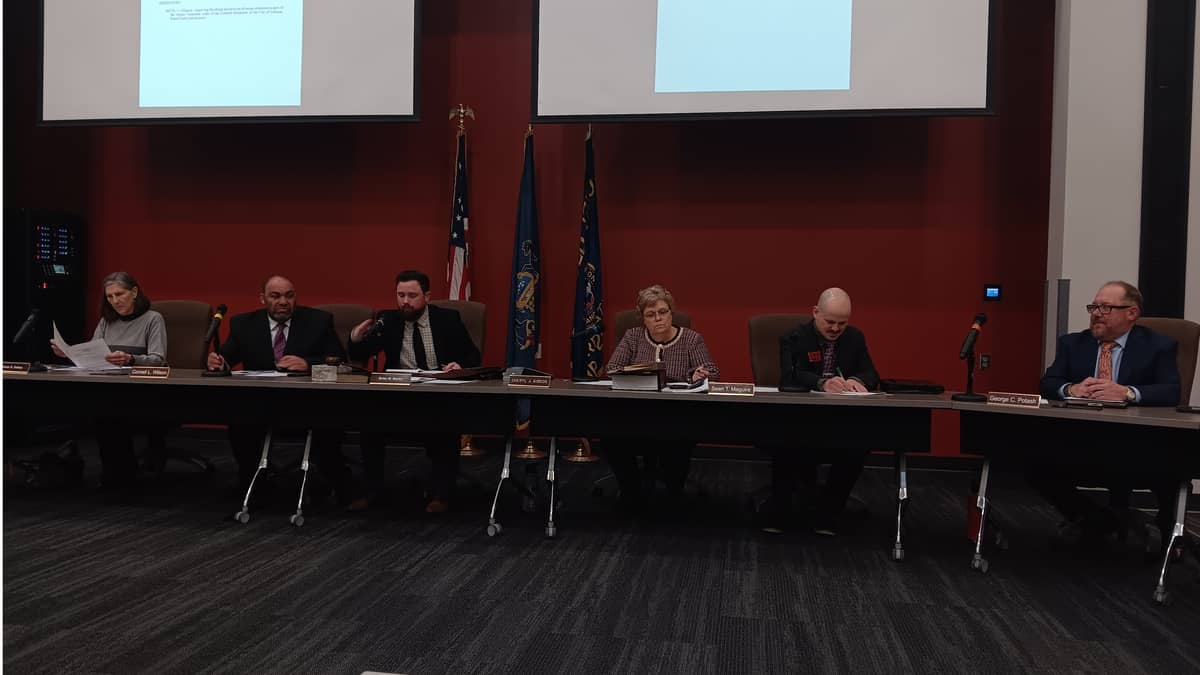“Henry Houck” is familiar to many Lebanon residents as an elementary school on Lehman Street, part of the Lebanon School District. But few are familiar with the wildly popular educator and statesman who lent his name to that school and several others in county history, and whose impact on schools across Pennsylvania helped set state standards for the 20th century.

From humble beginnings in Palmyra
Henry Houck was born in Palmyra on March 6, 1836, to Samuel and Rosanna Houck. Though his family was poor and Houck worked early in life as a cobbler and farmhand, he jumped at the opportunity for schooling in his adolescent years.
Unable to afford transportation, Houck walked five miles to the Annville Academy (which later became Lebanon Valley College) from Palmyra and back for his daily lessons. At only 16 years old, he began a two-year teaching position at a school in then-Londonderry Township (the township having not been split yet), educating children only years younger than himself for roughly a single dollar a day.
“That $22 per month looked like a fortune to me every time I drew it down,” said Houck of this first teaching position in a March 1916 article in the Harrisburg Daily Independent.
Houck married Susan Margaret Bucher in 1856, and together they would go on to raise seven children, five of which would outlive them. Though he had planned to go to Gettysburg for a college education, he was offered and accepted positions of principal at a Campbelltown school, followed by North Lebanon High School, and finally at Lebanon High School (at a $40 per month salary).
Houck continued to study as he taught and, in 1859, he assumed the role of Lebanon County Superintendent. It is noted in a historical retrospective article that he also took on the duties of the unelected office of City Superintendent. Houck was only 23 at the time, and was elected three more times to this “poorly paid” position. At the end of a successful nine years in office, he resigned to take on a clerkship in Harrisburg.
It was speculated that Houck accepted the position at least partially for financial reasons. The clerkship came with a $700 salary (roughly $12,000 in current value). One can only wonder what Houck was paid as a double-duty superintendent to make the new position seem desirable in comparison.

At the age of 33, Houck was promoted to Deputy State Superintendent of Public Schools in 1869, a position he would occupy for nearly four decades. In this role, he oversaw much administration of public schools across Pennsylvania and made frequent visits out to every corner of the commonwealth; he was “known to every school boy and girl in the state,” according to an obituary. Whether hyperbole or not, Houck’s influence was unarguably massive and he occupied the position through Democratic and Republican administrations alike. Houck even visited the newly-acquired territory of “Porto Rico” in 1901 to aid in the establishment of its public school system.

Houck was an an advocate for the so-called “Three Rs” of education (reading, writing, and ‘rithmetic, of course). He was also a firm believer that education continued throughout one’s entire life, and he made efforts to ensure that students saw opportunities for learning even after their public school years.
In 1896, Houck planned a run for Congress, a move that drew some ire from both opponents and members of his own Republican Party. Support in his local community was strong, however, and was bolstered by speeches (spoken in Pennsylvania Dutch) peppered with jokes and wit. However, Lebanon’s approval of him wasn’t enough to convince the party to place him on the ballot, and the nomination went to Marlin E. Olmsted of Dauphin County, who later won.
Houck assumed the position of Pennsylvania Secretary of Internal Affairs in 1907. This office, created in 1874 and repealed in 1967, was “assigned all the duties of the surveyor general, as well as duties involving the supervision of the activities of business organizations and charitable institutions,” according to the Pennsylvania Historical & Museum Commission.
Houck’s experience as a public servant prepared him well for the new role, and he was beloved by voters, who elected him two more times in 1910 and 1914. In a 1910 issue of the Lebanon Courier and Semi-Weekly Report, an article detailed just how popular “Heinrich” was:

Public support for Houck, who handily won each election to the office, was so widespread that it was speculated his popularity carried fellow Republicans on the ticket to victory as well.
Houck was serving in his third term when, in March of 1917, he died of “paralysis of the heart” in his home in Lebanon. Though his health was declining, the death was unexpected to friends and family. The week prior, he had celebrated his 81st birthday.
Houck’s funeral took place the following Friday, and the flag at the Capitol building was lowered to half-mast. According to a Daily News article on the 16th of March, “some thousands of people passed by the bier” at the Houck home on 5th and Chestnut Streets to pay their respects; these included hundreds of government officials and schoolchildren. He was buried at Mt. Lebanon Cemetery.
Houck’s now-vacant position as secretary was filled several months later by his own son, Paul W. Houck, who continued to serve for two years after his father’s death. Paul, born in 1866, had previously been a pharmacist and served one term as a state representative. He died in 1939, and was buried in the same cemetery as his father.

“Apostle of Sunshine”
Over his years in the public eye, Houck accumulated several nicknames, the “Grand Old Man of Lebanon” and “Uncle Henry” among them. But none have stuck so strongly with his name than “Apostle of Sunshine”, an honorific he was introduced with as early as 1906.
Though the exact origin of the title is unknown, it was one shared by a few contemporaries (e.g. Reverends A. A. Willits and Tilman Hobson), whose biographies allude to their sunny, even-tempered demeanor and extreme popularity. Houck certainly fit the bill:
“Harry Houck’s presence is a balm to the down-hearted, a tonic to the weary[…] he has a way of binding to himself in strong friendship, men, women, and children alike[.]”
Unnamed “prominent Lebanon manufacturer”, The Daily News, 12 June, 1896
Governor Martin Grove Brumbaugh, a close political and personal friend of Houck, spoke highly of him in a statement released after his death. “He carried, as a schoolman, the light of a sane educational policy into the entire country and to the islands of the sea,” said Brumbaugh.
“He was the best exemplar of the gospel of sunshine I ever knew.”
Houck’s oratory talent and style was well-known, in spite (or perhaps because of) his Pennsylvania Dutch “broken English”:
“A third of the time his audience was laughing, a third it was crying and the other third it was inwardly resolving ‘by heck’ to better the school conditions. And that third thing was what Henry was after all the time.”
Harrisburg Telegraph, 14 March 1917.
As a Christmas gift in 1903, schoolteachers from across the state raised over $1,000 to fund Houck’s dream of visiting Palestine. The idea had stemmed from his work in Puerto Rico two years earlier. Houck also visited many countries in Europe the following year on the funds raised by his supporters.

A shining educational legacy
Houck’s name should still be familiar for many local residents in the form of the Henry Houck Elementary School along Lehman Street in Lebanon. The school building was constructed in 1924, seven years after Houck’s death, and for a time served as a junior high building as well. “Henry Houck Day”–March 6–began at the school as a celebration of Houck and students who exemplified his virtues.
In addition to the still-operational elementary school, Houck’s name was attached to at least two other schools in the area. One of these, another elementary school located near N. 5th and Weidman Streets, is now occupied by apartments, and the other was a one-room schoolhouse just outside Jonestown.
Henry Houck, whose deeply personal understanding of the educational system guided him through a remarkable career and political life, knew intimately the value of a good public education, hard work, and an eye for opportunity. He is rightly remembered as the “Apostle of Sunshine” and his advice for children everywhere to make the most of their schooldays is just as paramount today as it was over a hundred years ago.
You can make a difference for LebTown.
Stories like this are brought to you for free thanks to the support of our members and advertisers. Join our cause and help sustain journalism in Lebanon County by signing up as a member.
Every Monday, our members get a glimpse of what’s coming ahead the rest of the week. Joining LebTown as a member is the best decision you can make if you care about local news in Lebanon County. Plus, invites to our exclusive Facebook group and happy hours, and other special offers.
Learn more and join now here.

























